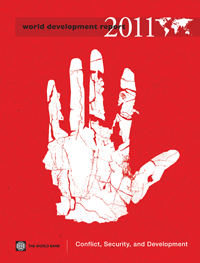[14 April 2011] -- Some 1.5 billion people live in countries affected by repeated cycles of political and criminal violence, and no low-income fragile or conflict-affected country has yet to achieve a single Millennium Development Goal.
Fixing the economic, political, and security problems that disrupt development and trap fragile states in cycles of violence requires strengthening national institutions and improving governance in ways that prioritise citizen security, justice, and jobs, according to the World Development Report (WDR) 2011.
Released earlier this week, the latest edition of the World Bank’s flagship annual report focuses on Conflict, Security and Development.
It explores the domestic and international stresses that lead to cycles of violence – such as unemployment, drug trafficking, and weak institutions – and outlines the devastating impact on a country or region’s development prospects. On average, countries where violence takes root have poverty rates more than 20 percentage points higher than in other countries.
In addition, people in fragile and conflict-affected states are:
- More than twice as likely to be undernourished as those in other developing countries;
- More than three times as likely to be unable to send their children to school; and
- Twice as likely to see their children die before age five.
Tools for long-term transformation
The WDR 2011 provides a set of tools that have been valuable to countries making successful transitions out of repetitive cycles of violence, to rebuild confidence between citizens and the state. They include transparency measures, special budget allocations for disadvantaged groups, new appointments, removal of discriminatory laws as well as credible commitments to realistic timelines for longer-term reform.
The report also outlines five practical programmes at the national level to link rapid confidence-building to longer-term institutional transformation:
- Support for community-based programmes for preventing violence, creating employment and delivering service, and offering access to local justice and dispute resolution systems in insecure areas.
- Programmes to transform security and justice institutions in ways that focus on basic functions and recognise the linkages among policing, civilian justice and public finances.
- Basic job creation schemes, including large scale public and community-based works that do not crowd out the private sector, access to finance to bring producers and markets together, and the expansion of access to assets, skills, work experience and finance.
- Involving women in security, justice and economic empowerment programmes.
- Focused anti-corruption actions that demonstrate how new initiatives can be well governed, drawing on external and community capacity for monitoring.
Adapting international assistance
Countries affected by repeated cycles of violence must gain an understanding of the stress factors that are driving the violence and hindering development, and come up with ways to deal with them. International agencies and donor organisations can support these countries by:
- Providing more, and more integrated, assistance for citizen security, justice and jobs, including greater assistance for job creation and to build well-governed police forces and justice systems.
- Reforming internal agency systems to support rapid action to restore confidence and long-term institution-building. This requires changing international agencies’ budgeting, staffing, and fiduciary management procedures to provide faster assistance and end stop-go patterns of aid.
- Acting at the regional and global levels on external stresses such as the impact on fragile states of international corruption, trafficking and food insecurity.
- Forging new international consensus on the norms of responsible leadership and encouraging exchange of knowledge that draws on the experience of middle-income countries.
Download the WDR 2011 from the World Bank’s website





